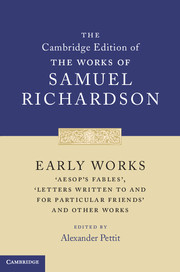Book contents
- Frontmatter
- Dedication
- Contents
- General Editors’ Preface
- Acknowledgements
- Chronology
- List of Abbreviations
- General Introduction
- Textual Introduction
- The Apprentice’s Vade Mecum (1733)
- A Seasonable Examination of the Pleas and Pretensions (1735)
- Preface to Aubin, A Collection of Entertaining Histories and Novels (1739)
- Aesop’s Fables (1739)
- Letters Written to and for Particular Friends (1741)
- Six Original Letters Upon Duelling (1765)
- Appendix: The Infidel Convicted (1731)
- Postscript
- Emendations
- Word-division
- Bibliographical Descriptions of Early Editions
- Explanatory Notes
- Index
Letter LXXXVIII
Published online by Cambridge University Press: 30 June 2022
- Frontmatter
- Dedication
- Contents
- General Editors’ Preface
- Acknowledgements
- Chronology
- List of Abbreviations
- General Introduction
- Textual Introduction
- The Apprentice’s Vade Mecum (1733)
- A Seasonable Examination of the Pleas and Pretensions (1735)
- Preface to Aubin, A Collection of Entertaining Histories and Novels (1739)
- Aesop’s Fables (1739)
- Letters Written to and for Particular Friends (1741)
- Six Original Letters Upon Duelling (1765)
- Appendix: The Infidel Convicted (1731)
- Postscript
- Emendations
- Word-division
- Bibliographical Descriptions of Early Editions
- Explanatory Notes
- Index
Summary
The Lady's forgiving Return.,
SIR,
I cannot help answering your Letter, because you seem sensible of your Fault. If your Temper is so captious, your Guard against it should be the stronger. It is no very comfortable View, let me tell you, that one sees a Person who wants to recommend himself to one's Friendship, so ready to take Fire. What has a Woman to do in common Discretion, but to avoid, while she can, a Prospect so unpleasing? For if she knows she cannot bear disreputable Imputations, as indeed she ought not, and that the Gentleman is not able to contain himself whenever he is pleased to be moved, from giving them; why this, truly, affords a most comfortable Appearance of a happy Life! However, Sir, I cannot bear Malice for a first Fault, tho’ yet it looks like a Temper, even in a Friend, that one would rather fear than love. But if it be never repeated, at least till I give such Reasons for it, that neither Charity, nor a professed Esteem, can excuse, I shall hope, that what has happen’d may rather be of good than bad Use to us both. But indeed I must say, that if you cannot avoid such disagreeable Instances of your Sensibility, it will be Justice to both, now we are both free, to think no more of
Your humble Servant.
- Type
- Chapter
- Information
- Early Works'Aesop's Fables', 'Letters Written to and for Particular Friends' and Other Works, pp. 420Publisher: Cambridge University PressPrint publication year: 2011

